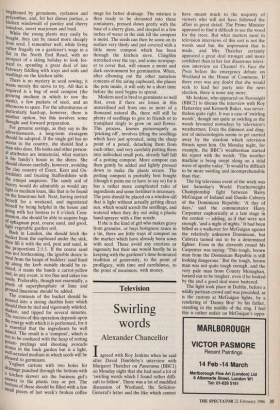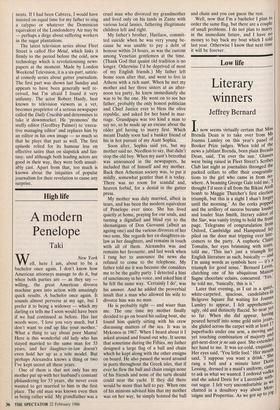Television
Swirling words
Alexander Chancellor
Iagreed with Roy Jenkins when he said after David Dimbleby's interview with Margaret Thatcher on Panorama (BBC1) on Monday night that she had used a lot of 'swirling words which I found rather diffi- cult to follow'. There was a lot of muddled discussion of Westland, the Solicitor- General's letter and the like which cannot have meant much to the majority of viewers who will not have followed the affair in great detail. The Prime Minister appeared to find it difficult to see the wood for the trees. But what matters most in television interviews of this sort is not the words used but the impression that is made, and Mrs Thatcher certainly appeared a great deal stronger and more confident than in her last disastrous televi- sion interview on Channel 4's Face the Press before the emergency debate on Westland in the House of Commons. If there ever was any doubt that she would seek to lead her party into the next election, there is none any more.
Mr Jenkins, who appeared on Newsnight (BBC2) to discuss the interview with Roy Hattersley and Kenneth Baker, was never- theless quite right. It was a case of 'swirling words', though not quite as swirling as the words favoured nowadays by television's weathermen. Even the dimmest and ding- iest of meteorologists seems to get carried away by the stardom which television thrusts upon him. On Monday night, for example, the BBC's weatherman started his report with the words: 'The weather machine is being swept along on a tidal wave of apathy today.' It would be difficult to be more swirling and incomprehensible than that.
The big television event of the week was last Saturday's World Featherweight Championship fight between Barry McGuigan of Ireland and Danilo Cabrera of the Dominican Republic: 'A day of days,' said the commentator Harry Carpenter euphorically at a late stage in the contest — adding, as if that were not enough, 'and a night of nights.' It had been billed as a walkover for McGuigan against the relatively unknown Dominican, but Cabrera turned out to be a determined fighter. Even in the eleventh round Mr Carpenter was saying: 'This tough, brown man from the Dominican Republic is still looking dangerous.' But the tough, brown man was not quite tough enough, and the very pale man from County Monaghan, turned out to be tougher, even if he looked by the end a good deal more battered.
The fight took place in Dublin, before a wildly partisan crowd and was preceded, as is the custom at McGuigan fights, by a rendering of 'Danny Boy' by his father, standing in the middle of the ring. I feel this is rather unfair on McGuigan's oppo- nents. If I had been Cabrera, I would have insisted on equal time for my father to sing a calypso or whatever the Dominican equivalent of the Londonderry Air may be — perhaps a dirge about suffering workers in the sugar plantations.
The latest television series about Fleet Street is called Hot Metal, which links it firmly to the period before the cold, new technology which is revolutionising news- papers at the moment. Made by London Weekend Television, it is a six-part, satiric- al comedy series about gutter journalism. The first part was shown last Sunday and appears to have been generally well re- ceived, but I'm afraid I found it very unfunny. The actor Robert Hardy, best known to television viewers as a vet, becomes proprietor of a serious newspaper called the Daily Crucible and determines to take it downmarket. He 'promotes' the stuffy editor (Geoffrey Palmer) to 'execu- tive managing editor' and replaces him by an editor in his own image — so much so that he plays that part as well. The first episode relied for its humour less on effective satire than on slapstick and fan- tasy; and although both leading actors are good in their way, they were both unsuit- ably cast. Apart from that, too much is known about the iniquities of popular journalism for their revelation to cause any surprise.















































 Previous page
Previous page